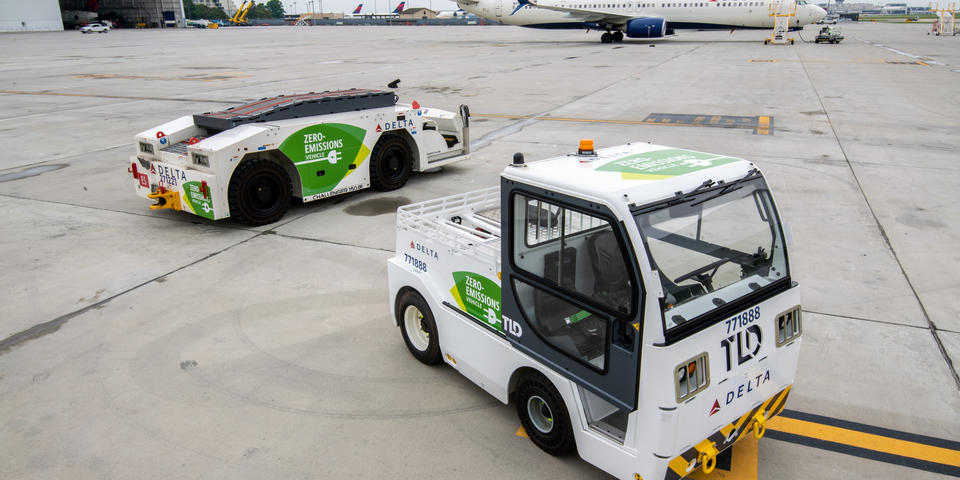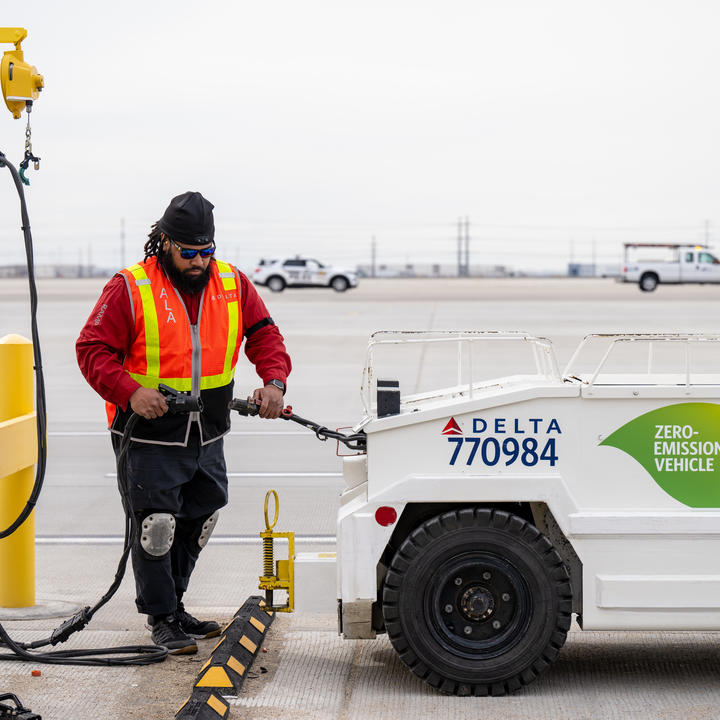Delta lauded for innovation in 2023 Sustainable Flight Challenge
Delta shortlisted for ‘Best Innovation’ and ‘Lowest CO2 Emissions Ground Ops’ awards, and the airline won two categories: “Lowest CO2 Ground Emissions Home Base” for its ground support equipment and “Best Innovation Wildcard” for overall high performance in innovation in 2023 SkyTeam Alliance Sustainable Flight Challenge.

In this year’s Sky Team Alliance Sustainable Flight Challenge, Delta Air Lines took home the top prize in two categories: “Lowest CO2 Ground Emissions Home Base” for electric ground support and “Best Innovation Wildcard” for several high-quality submissions.
The judges delivered the results at a gala Tuesday attended by participating airlines and a number of industry partners. Delta was also a finalist in both “Best in Innovation” and “Lowest CO2 Emissions Ground Ops” categories.
Innovation and collaboration are essential to decarbonize the hard-to-abate airline industry. They’re also core to Delta’s DNA, which is why Delta once again participated in the second annual Sky Team Alliance’s Sustainable Flight Challenge in May. Participating airlines explored new ways of operating and delivering sustainable experiences in an effort to accelerate the industry’s progress toward more sustainable travel and net zero by 2050.
“If we’re going to be successful in reaching our goals, players from across our industry need to be going down different paths and trying new things to see what works best,” said Amelia DeLuca, Delta’s Chief Sustainability Officer. “No one airline or manufacturer or supplier can do this alone. What I love most about The Sustainable Flight Challenge is it gives all of us in the industry the opportunity to test new solutions, get feedback in real time from employees and customers, and compete in a collaborative way that spurs even more innovation for the sustainable future of flight.”
The challenge brought together industry innovators while giving airlines a platform to test and showcase parts of their sustainability strategies in action. Delta participated using its most fuel-efficient aircraft, with roundtrip flights from Los Angeles to Atlanta (medium-haul domestic) on May 17 and Atlanta to Paris (long-haul international) on May 23.
Participating airlines’ efforts were evaluated by an esteemed panel of judges, including professor of aeronautics and astronautics at the Massachusetts Institute of Technology and director of MIT’s Laboratory for Aviation and the Environment, Steven Barrett; Dr. Fang Liu, former Secretary General of the International Civil Aviation Organization; and Tom Williams, former Chief Operating Officer of Airbus.
The global airline showed up in a number of ways that showcased its overall sustainability strategy of embedding sustainability in everything it does while working to eliminate its climate impact from flying. In totality, the below actions added up to Delta’s Best Innovation Wildcard win.
Embedding Sustainability in Everything We Do
Electrifying ground support equipment (GSE) - WINNER
Delta used 100% electric ground support equipment for its challenge flights in Atlanta and Los Angeles, the respective departure and arrival locations for some test flights. The impact of electrification for Delta people and local communities can be linked to improved air quality, less hazardous waste and lower noise pollution. This work helped position Delta as a finalist in the Lowest CO2 Emissions Ground Ops category. Delta is working toward 100% electrification of GSE core fleet (baggage tractors, belt loaders and aircraft tow tractors) in five hubs by 2025, with Salt Lake City and Boston nearly there already.
Testing alternatives for plastic cups
With nearly 7 million pounds of plastic cups onboard every year, Delta tested a reusable cup system and new paper cups. This is one of the greatest opportunities for Delta to reduce its single-use plastic footprint in flight. Finding the perfect cup is more challenging than it may seem – and the obvious choice isn’t always the most sustainable when weight and cup liner materials are considered. The plastic replacement needs to withstand hot, cold and alcoholic beverages while delivering a consistent customer experience. Once operationalized, these actions will help Delta make progress against its goal to minimize single-use plastic onboard by 2025.
Minimizing waste onboard
The crew separated items such as reusable cups and recyclable materials from general waste which helps make progress towards Delta’s goal of 65% waste diversion from landfill by 2035.* Additionally, the LAX-ATL test flight was a zero-waste flight, meaning 90+% landfill diversion for on board products by composting, reusing, and recycling, which helped position Delta as a leader in Best overall Innovation.
Eliminating Our Climate Impact From Flying
Using Sustainable Aviation Fuel (SAF)
Delta partnered with U.S.-based SAF startup Gevo and Finnish company Neste to source and deliver 8,000 gallons of SAF to Atlanta and Los Angeles airports. Today, SAF is the most effective tool to decarbonize the aviation industry, as it has up to 80% less lifecycle greenhouse gas emissions than traditional jet fuel. The challenge, however, is that there is not enough being produced today. Delta has contracts for half of its goal of 10% SAF usage by the end of 2030, but it’ll take cross-stakeholder partnerships from producers, airlines, governments and others to properly scale this proven solution.
Reducing potable water in the air
Delta tested decreasing the amount of water loaded onto the aircraft to fly lighter without compromising safety or customer experience. By doing this, the company was able to save over 1,100 pounds of water weight, which helped save approximately 1,200 pounds of CO2 emissions. This highly scalable solution is critical as Delta continues to work towards fuel efficiency improvement, saving 45 million gallons of fuel from operational enhancements by 2025.
Delta also tested a number of sustainable solutions to enhance the onboard experience, including 3-D printed reusable and refillable water dispensers to eliminate traditional 1.5L single-use plastic water bottles on flight; local menu options from regenerative farms; and new earbuds made with recycled plastic. Additionally, the in-flight supply chain was customized to highlight Delta’s most sustainable vendors, such as beer and wine partners who are prioritizing 100 percent carbon neutrality, plastic-free packaging, and organic ingredients. The Sustainable Flight Challenge is a great forum to test different solutions to see what is possible for the future, all while getting real-time feedback from customers and employees.
As a result of the innovation tested and showcased at Sustainable Flight Challenge, Delta was named a winner for “Lowest CO2 Ground Emissions Home Base” for electric ground support equipment and “Best Innovation Wildcard” for Delta’s overall high performance in innovation. The airline was also shortlisted as a finalist in both ‘Best in Innovation’ and ‘Lowest CO2 Emissions Ground Ops’ categories. This is the second installation of The Sustainable Flight Challenge, and this year, the showcase was hosted by Delta at the Delta Flight Museum from October 2-4, 2023 where many of the innovations were on display.
Learn more about SkyTeam’s Sustainable Flight Challenge.


